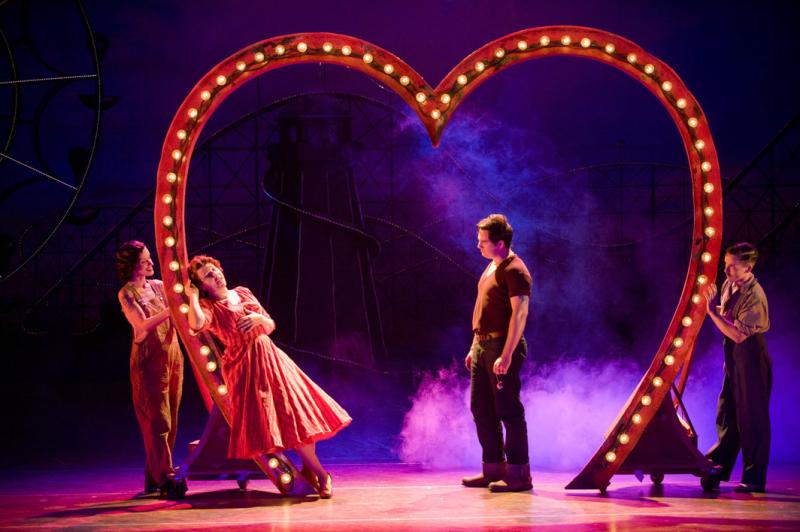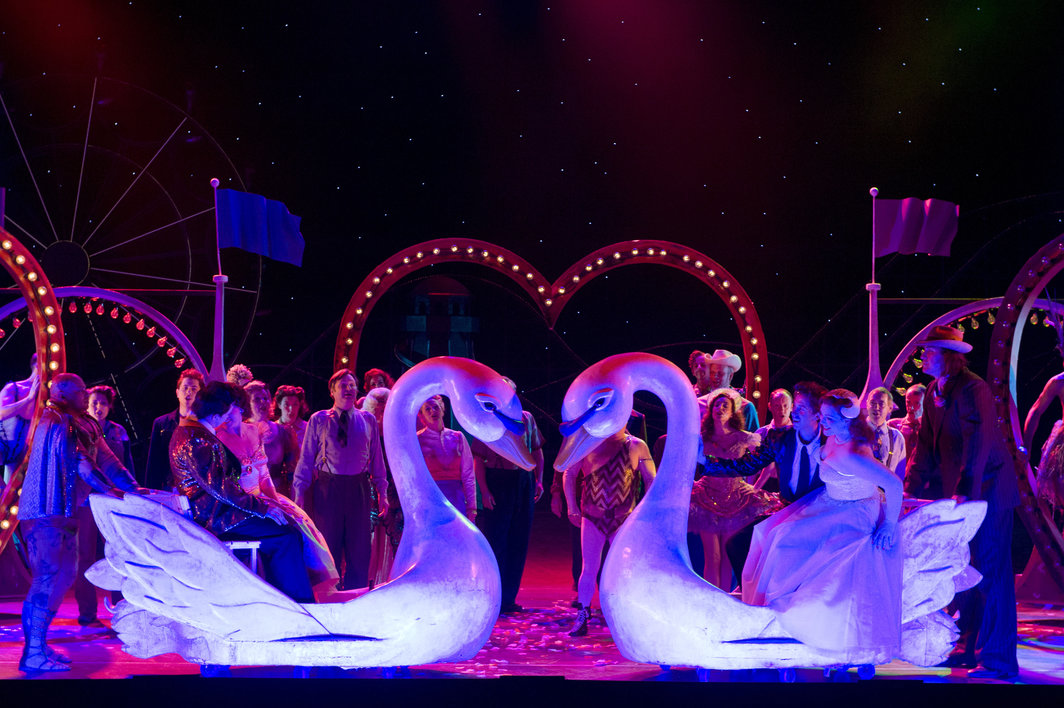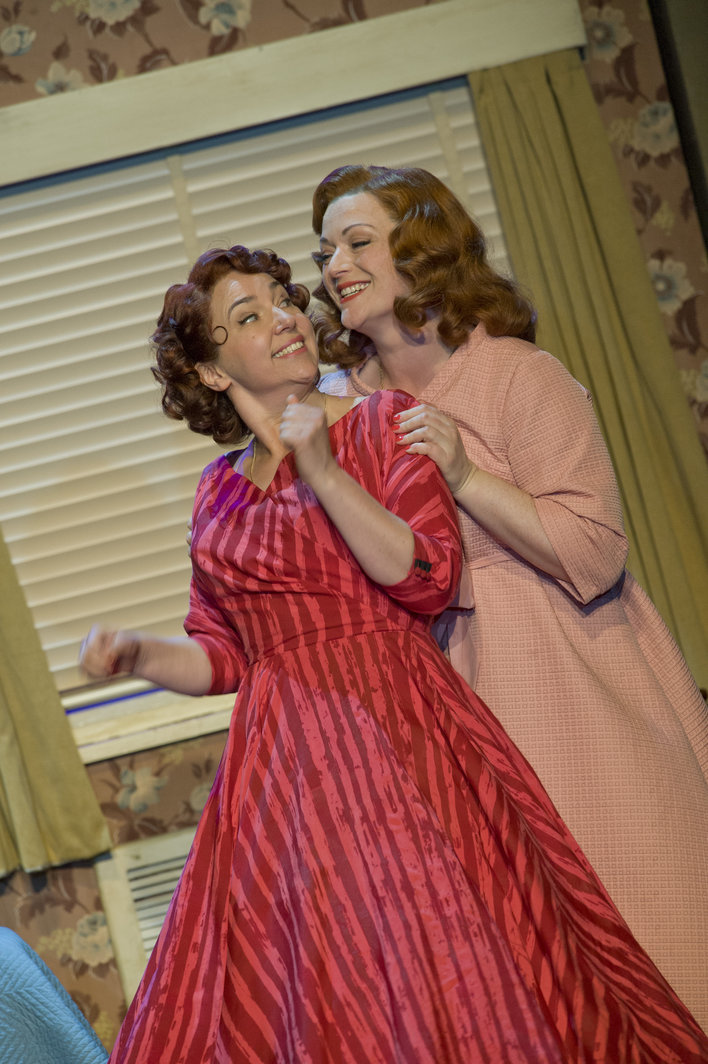Così fan tutte, English National Opera | reviews, news & interviews
Così fan tutte, English National Opera
Così fan tutte, English National Opera
A superb and imaginative take on a classic operatic comedy

A cheeky series of signs raised at the start of Phelim McDermott’s new Così fan tutte for English National Opera promise “Big Arias”, “Intrigue”, “Lust” and “Chocolate” (among other things). Big pledges, all. And almost all delivered by this witty, exuberant and quietly revisionist production of Mozart’s challenging comedy.
The two young couples find themselves on holiday in Coney Island in the late 1950s, swapping twinsets, sensible flats and suppressed desires for the wild delights of the fair, where men wear lycra, women wear beards (and little else), and no fantasy or fetish remains unfulfilled.
McDermott crafts an intoxicating world – part visual camp, part hallucinogenic horrow-show
On the basis of McDermott’s two previous shows for ENO – Philip Glass’s Satyagraha and The Perfect American – it was hard to know what to expect of a director still finding his feet in the opera house. What looked like visual fussiness and a lack of musical trust in Glass (cascading papers, projections, giant fantastical creatures, mythic cityscapes) was here recast as a quite natural desire to fill in the gaps. Faced with the complicated excess of Mozart’s score and the complexity of his central quartet, McDermott didn’t so much do less, as do what he does more joyously and intelligently.
 Given characters rather than Glass’s awkward ciphers, he discovered wonderfully human details in them (aided throughout by a characteristically nimble and witty libretto from Jeremy Sams), relishing every foible and facet as well as those of their colourful surroundings. Together with designer Tom Pye, McDermott crafts an intoxicating world – part visual camp, part hallucinogenic horrow-show – in which everything is exaggerated, excessive. Love comes gliding past in a giant fibreglass swan, while despair sends you soaring into the air in your own personal hot air balloon. A “Skills Ensemble” of real circus performers completes the scene – a freakshow into which Mozart’s figures dissolve with disconcerting ease.
Given characters rather than Glass’s awkward ciphers, he discovered wonderfully human details in them (aided throughout by a characteristically nimble and witty libretto from Jeremy Sams), relishing every foible and facet as well as those of their colourful surroundings. Together with designer Tom Pye, McDermott crafts an intoxicating world – part visual camp, part hallucinogenic horrow-show – in which everything is exaggerated, excessive. Love comes gliding past in a giant fibreglass swan, while despair sends you soaring into the air in your own personal hot air balloon. A “Skills Ensemble” of real circus performers completes the scene – a freakshow into which Mozart’s figures dissolve with disconcerting ease.
While the production is a winner, there were some musical kinks to this first performance (and, I suspect, this first run) that leave room for growth. Casting is the main culprit, a haphazard affair that had me wondering whether they had picked names out of a hat.
Neither a show-stealingly charismatic Roderick Williams (Don Alfonso) nor an almost equally impressive Mary Bevan (Despina) felt like a natural fit for their roles. Although Bevan has charm in buckets and proved that she can sing wonderfully well in any accent asked of her (with or without line-dancing accompaniment), she still feels a bit light and a bit high for the worldly maid. Williams, by contrast, seems far too youthful, too energetic for her cynical fellow-schemer.
Combine the youth and baritonal colours of Williams and the excellent Marcus Farnsworth (Guglielmo) and you lack those proper bass shades that would help root vocal action that often seemed in danger of losing its anchor. Everything about the show trades tragedy for laughs – an approach which works well dramatically, but which musically lacks that depth and power.
 Christine Rice as Dorabella (pictured left with Valentine) is luxury casting, and the mezzo seems to relish a rare opportunity to give her comedic skills an airing. But while I’m fully prepared to believe that Kate Valentine has a good Fiordiligi in her, this just wasn’t it. A voice that carved so delicately heartbreaking a path through “Porgi, amor” in the recent Figaro just wasn’t finding the same range here, forcing “Soave il vento” into a much more strident place than it should sit, and never quite feeling in command of the music. Tenor Randall Bills (Ferrando) had a tough night, almost coming off the rails entirely at one point, and feeling blurred and unfocused when compared to the HD of Farnsworth’s delivery. Ryan Wigglesworth’s pit was often at odds with the stage, which didn’t help, holding back as singers dashed forwards and never quite persuading them to settle into the orchestral tempos.
Christine Rice as Dorabella (pictured left with Valentine) is luxury casting, and the mezzo seems to relish a rare opportunity to give her comedic skills an airing. But while I’m fully prepared to believe that Kate Valentine has a good Fiordiligi in her, this just wasn’t it. A voice that carved so delicately heartbreaking a path through “Porgi, amor” in the recent Figaro just wasn’t finding the same range here, forcing “Soave il vento” into a much more strident place than it should sit, and never quite feeling in command of the music. Tenor Randall Bills (Ferrando) had a tough night, almost coming off the rails entirely at one point, and feeling blurred and unfocused when compared to the HD of Farnsworth’s delivery. Ryan Wigglesworth’s pit was often at odds with the stage, which didn’t help, holding back as singers dashed forwards and never quite persuading them to settle into the orchestral tempos.
No Così can be called great (or even good) until its ending, and here McDermott scores his final trick. The unusually feisty and appealing women are too human to default obediently to their original lovers, and the final ensemble stages a brisk communal wife-swap, with each trading each quite happily for another, no longer concerned by fidelity, loyalty or commitment. This is sexual politics Enlightenment-style, and in a cast of bearded ladies and flesh-eating demon-boys, what’s most shocking is just how contemporary it all feels. A sexist parable has become an anarchic fantasy – a transformation that’s no sideshow illusion.
- Cosi fan tutte is at English National Opera until 4 July, 2014
rating
Explore topics
Share this article
Add comment
The future of Arts Journalism
You can stop theartsdesk.com closing!
We urgently need financing to survive. Our fundraising drive has thus far raised £49,000 but we need to reach £100,000 or we will be forced to close. Please contribute here: https://gofund.me/c3f6033d
And if you can forward this information to anyone who might assist, we’d be grateful.

Subscribe to theartsdesk.com
Thank you for continuing to read our work on theartsdesk.com. For unlimited access to every article in its entirety, including our archive of more than 15,000 pieces, we're asking for £5 per month or £40 per year. We feel it's a very good deal, and hope you do too.
To take a subscription now simply click here.
And if you're looking for that extra gift for a friend or family member, why not treat them to a theartsdesk.com gift subscription?
more Opera
 Buxton International Festival 2025 review - a lavish offering of smaller-scale work
Allison Cook stands out in a fascinating integrated double bill of Bernstein and Poulenc
Buxton International Festival 2025 review - a lavish offering of smaller-scale work
Allison Cook stands out in a fascinating integrated double bill of Bernstein and Poulenc
 Tosca, Clonter Opera review - beauty and integrity in miniature
Happy surprises and a convincing interpretation of Puccini for today
Tosca, Clonter Opera review - beauty and integrity in miniature
Happy surprises and a convincing interpretation of Puccini for today
 Hamlet, Buxton International Festival review - how to re-imagine re-imagined Shakespeare
Music comes first in very 19th century, very Romantic, very French operatic creation
Hamlet, Buxton International Festival review - how to re-imagine re-imagined Shakespeare
Music comes first in very 19th century, very Romantic, very French operatic creation
 Falstaff, Glyndebourne review - knockabout and nostalgia in postwar Windsor
A fat knight to remember, and snappy stagecraft, overcome some tedious waits
Falstaff, Glyndebourne review - knockabout and nostalgia in postwar Windsor
A fat knight to remember, and snappy stagecraft, overcome some tedious waits
 Salome, LSO, Pappano, Barbican review - a partnership in a million
Asmik Grigorian is vocal perfection in league with a great conductor and orchestra
Salome, LSO, Pappano, Barbican review - a partnership in a million
Asmik Grigorian is vocal perfection in league with a great conductor and orchestra
 Semele, Royal Opera review - unholy smoke
Style comes and goes in a justifiably dark treatment of Handelian myth
Semele, Royal Opera review - unholy smoke
Style comes and goes in a justifiably dark treatment of Handelian myth
 Le nozze di Figaro, Glyndebourne review - perceptive humanity in period setting
Mostly glorious cast, sharp ideas, fussy conducting
Le nozze di Figaro, Glyndebourne review - perceptive humanity in period setting
Mostly glorious cast, sharp ideas, fussy conducting
 Fidelio, Garsington Opera review - a battle of sunshine and shadows
Intimacy yields to spectacle as Beethoven's light of freedom triumphs
Fidelio, Garsington Opera review - a battle of sunshine and shadows
Intimacy yields to spectacle as Beethoven's light of freedom triumphs
 Dangerous Matter, RNCM, Manchester review - opera meets science in an 18th century tale
Big doses of history and didaction are injected into 50 minutes of music theatre
Dangerous Matter, RNCM, Manchester review - opera meets science in an 18th century tale
Big doses of history and didaction are injected into 50 minutes of music theatre
 Mazeppa, Grange Park Opera review - a gripping reassessment
Unbalanced drama with a powerful core, uninhibitedly staged
Mazeppa, Grange Park Opera review - a gripping reassessment
Unbalanced drama with a powerful core, uninhibitedly staged
 Saul, Glyndebourne review - playful, visually ravishing descent into darkness
Ten years after it first opened Barrie Kosky's production still packs a hefty punch
Saul, Glyndebourne review - playful, visually ravishing descent into darkness
Ten years after it first opened Barrie Kosky's production still packs a hefty punch
 Così fan tutte, Nevill Holt Festival/Opera North review - re-writing the script
Real feeling turns the tables on stage artifice in Mozart that charms, and moves
Così fan tutte, Nevill Holt Festival/Opera North review - re-writing the script
Real feeling turns the tables on stage artifice in Mozart that charms, and moves

Comments
‘Everything about the show